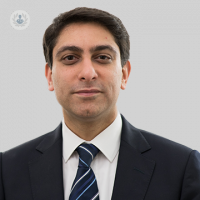A cure for lung cancer?
Written in association with:Dr Neal Navani is one of the UK's leading respiratory medicine specialists who has a clear view on the importance of lung cancer screening as a means of preventing and lowering the rates of lung cancer mortality.

How common is lung cancer in the UK?
Unfortunately, lung cancer remains the largest cause of cancer death in the UK. There are over 40,000 cases diagnosed each year and more than 30,000 people in the UK die of lung cancer each year. It has recently overtaken breast cancer as the most common cause of cancer death in women. It remains an enormous public health problem in the UK and worldwide and deserves urgent attention.
How important is lung cancer screening?
Lung cancer screening has been shown to save lives. In a trial in the USA published in 2011, lung cancer screening demonstrated a 20% reduction in mortality from lung cancer and over a 6-7% reduction in overall mortality in the general population. In other words, lung cancer screening with low-dose chemotherapy treatment has been proven to save lives. It has now been implemented as a major screening program in the USA, but pending further information, it has yet to be implemented in the UK.
How can lung cancer screening help in the treatment and prevention of lung cancer?
One of the major causes of poor survival for patients with lung cancer is late detection. This means that the majority of patients who present with lung cancer have advanced disease and therefore cannot be cured. Lung cancer screening offers a major opportunity to detect these patients’ lung cancer at an earlier stage where a cure is possible. Currently, approximately 18% of lung cancer patients in the UK can be cured by surgery, however, the implementation of a lung cancer screening program could potentially increase this figure up to 60%.
How can I ask my doctor about lung cancer screening?
Please do ask your doctor about lung cancer screening. It has been demonstrated to save lives in patients who are at high risk of developing lung cancer. If you are a current smoker or have smoked in the past it would be important to discuss this further with your doctor.
Should everyone be screened for lung cancer?
When determining whether someone should be screened for lung cancer, it is important to discuss the risks and the benefits. It has been shown that only people at a high risk of lung cancer will benefit from screening, whereas those who are not at high risk, unfortunately, may suffer harm. Currently, lung cancer screening is generally recommended for those between the ages of 55 and 80 who have smoked at least one packet of cigarettes a day for more than 30 years. This means that those people at the highest risk of lung cancer are those that should be screened. Unfortunately, it is currently not recommended to screen those people at lower risk since they may experience more harm than benefit. It is important to discuss this – the risks versus the benefits of lung cancer screening – with your doctor.
If you are concerned and would like to enquire about lung cancer screening, make an appointment with a specialist.


